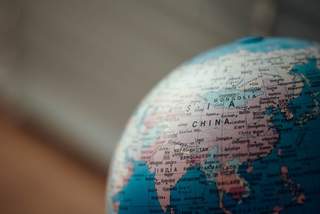
© Chuttersnap/Unsplash
German companies are globalisation winners
We are globalisation winners – and yes, in both senses of the word. Not only does the German economy have stronger ties with other national economies than, say, the US (third place) or Hong Kong (second place), it also profits more from them. However, the technical and especially the political performance framework for German companies in international networking matters still lags behind. The sooner the development of these areas follows suit, the sooner industry could profit more from its activities in the global market over the last few years.
Active collaboration with other countries
Here’s a fictitious example. Let’s say there is a company that has developed a system for the production, storage and transport of renewable energy. As the inherent opportunities in Germany are limited, the system is tested in Africa and Asia too. Over time a network builds up of experts, suppliers, employees, researchers and investors, from Germany and many other countries too. Sometimes the company relies on collaborations, sometimes it invests in shares in foreign companies (in 2012 German companies held 290 billion euros worth of such investments). The company uses these collaborations and investments to further develop its products and so progresses more quickly. Why? Because it can use their existing knowledge instead of laboriously building up its own knowledge in-house. At the same time it reduces costs because it does not need to establish each development division in-house. And almost by accident new markets open up with interesting customers because many of the partners come from countries where systems for using solar and wind energy can be deployed much more effectively than in Germany.
Many German industrial companies have been doing just what our example company did, and for many years they have been benefitting from the know-how of their international partners and at the same time establishing themselves in foreign markets.
In the future, the majority will prove to have been wise investments. In order to keep the growth of the German economy stable or to increase it, the companies will not be able to put as much emphasis as before on factors such as labour and capital. The population will get older and smaller, and the proportion of the population that is working-age will steadily shrink. In order to grow further and to stay competitive internationally it will be necessary to have stronger technological innovation. And that greatly depends on the existing knowledge within companies. By creating networks that pool cutting-edge, highly specialised knowledge, these companies are already setting the course for a successful international future.
Investing in research
They have a multi-pronged approach. In addition to building international networks, German businesses are investing heavily in research and science, above all to ensure that if foreign networks collapse temporarily or regionally they are not left behind.
Suppose that today’s emerging economies, those that our example company is working with, succeed in becoming industrialised nations. They might terminate their collaboration with our energy company in order to use their knowledge and labour resources for themselves and so become direct competitors. While this is not good news for our energy company, it will not bankrupt them because, like many large industrial companies, the company in our example has invested in research. In fact it has invested significantly, as Germany is a world leader in this area too (in big industries, companies invest between 40 and 60 percent of their gross equipment investment in research and development). This research is carried out within the company itself but also through collaborations with large research institutes or applied research institutions. In this way, German industry remains innovative and keeps its competitive edge.
Connected at all levels
The entrepreneur in our example keeps a close eye on political and technological developments. He knows that knowledge-intensive and highly complex products and services will sell well in the future. If he is to be able to offer them at a profitable price, however, he needs more room to act and trade freely. He expects the Transatlantic Trade and Investment Partnership (TTIP) that is currently being discussed to do a great deal for him in that respect. On the one hand, he would benefit directly if trade with American companies were to be subject to fewer constraints – including those of a financial nature. On the other hand, he knows that the standards discussed in TTIP could also be implemented in subsequent trade agreements with other regions in the world. This will save costs and make it easier to enter new markets. Because our energy entrepreneur would not be required to develop new products and production processes to enter those markets.
This requires even greater coherence at the European level
In technological terms, industrial companies have long been in the position of being able to network their production sites and machines across national borders, and thus increase both productivity and efficiency. Only the political and technological framework has been lacking thus far – or it is so different in different countries so as to be simply incompatible.
The energy entrepreneur from our example is already in the starting blocks. With smooth integration, he could initially test his systems for generating, storing and transporting renewable energies digitally, and could simulate various locations and weather conditions. Real-time data on climatic, geographical, technological and political conditions in the respective countries would then be compiled for the test runs. This would get the product market-ready not just for one country but tailor it to the individual needs of many potential customers extremely quickly.
The elements are in place: German industry has a passion for innovation and a great willingness to invest. The conditions are thus ideal for Germany to benefit from its leading position in the global economy even more in the future.



